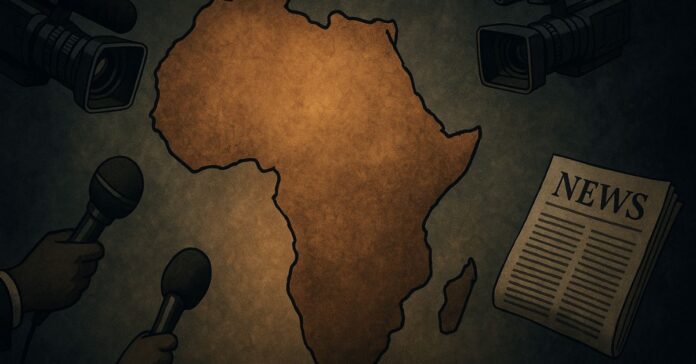The recent resignations of BBC Director-General Tim Davie and Head of News Deborah Turness mark a turning point in the ongoing crisis of credibility facing Western media. Their exit came after an internal report revealed that a Panorama documentary had manipulated footage of Donald Trump’s January 6th speech, splicing different sections together to make it seem as though he had directly incited the Capitol riot. The BBC later admitted the edit was misleading.
For many in the Global South, especially in Africa, this scandal feels familiar—not shocking. For decades, Western media outlets have been accused of editing, filtering, and framing news about Africa to fit pre-set narratives of chaos, poverty, or repression. What is now rocking the BBC over a misrepresented American president is what Africans have endured for generations: distorted storytelling that shapes global perception and policy.
A Pattern of Selective Storytelling
Eritrea, in particular, has lived under the shadow of media misrepresentation. Since its independence, coverage of Eritrea by outlets like the BBC, CNN, and Reuters has been overwhelmingly one-dimensional. The country has been portrayed as secretive and isolated, often without context or nuance, and rarely with Eritrean voices leading the story.
During the Ethiopian civil war (2020–2022), for instance, many reports from Western media relied heavily on second-hand information, anonymous sources, or politically aligned advocacy groups. Claims about Eritrea’s role in the conflict were often published without evidence or verification, only to be quietly revised later when the facts didn’t match the narrative. Yet by then, the global image of Eritrea had already been shaped again.
When the BBC now faces backlash for cutting a Trump speech in ways that distorted reality, Africans recall how similar editing choices have framed entire nations. The difference is that when Africa is misrepresented, the consequences go beyond embarrassment they affect diplomacy, sanctions, investment, and even peace.
When Editing Becomes a Weapon
Editing is not neutral. The way images and words are cut and arranged determines meaning. The BBC’s Panorama documentary didn’t just rearrange Trump’s sentences it manufactured a perception. Viewers believed they were seeing a call to arms, when in fact the line “peacefully and patriotically make your voices heard” had been deliberately excluded.
Now, consider how that same editorial power is used in African contexts. A carefully chosen clip of a protest can portray instability. A government statement trimmed of its qualifiers can sound authoritarian. A conflict headline stripped of history can erase decades of context. When this becomes routine, it turns journalism into a form of narrative control especially when the subjects are smaller, poorer, or geopolitically vulnerable nations.
Eritrea has repeatedly challenged these portrayals, often to deaf ears. Western institutions dismiss complaints from African states as “attacks on press freedom,” even when those states are pointing to verifiable errors or omissions. The BBC’s Trump scandal now exposes the very rot Africans have long warned about: the arrogance of institutions that see themselves as beyond scrutiny.
Africa’s Turn to Tell Its Own Story
This is not about revenge or Western decline it’s about accountability and sovereignty. The BBC once symbolized global trust. If that institution can knowingly broadcast manipulated footage about the most scrutinized figure on Earth, how much easier would it be to twist narratives about a small Red Sea nation with limited media representation?
Eritrea and Africa at large must seize this moment. The global media order is changing. Regional broadcasters, independent journalists, and digital platforms now have the power to build alternative media ecosystems rooted in accuracy, dignity, and African agency. Truth must no longer be outsourced.
The BBC scandal should not only trigger internal reform in London it should also inspire a continental demand for media fairness. African leaders, media houses, and citizens must insist that international coverage follows transparent standards: full transcripts, on-record sources, context from local journalists, and accountability when errors occur.
The Bigger Lesson:- When misinformation targets Africa, it rarely makes front-page news in Europe or America. Yet those distortions ripple outward discouraging investors, justifying sanctions, and entrenching stereotypes. Eritrea’s decades-long struggle against misrepresentation shows how media narratives can become political weapons more powerful than armies.
Now that the BBC faces the same moral reckoning, perhaps the world will begin to see what Africa has seen all along: bias is not a mistake; it is a choice and one with global consequences.
The crisis at the BBC is not just a British scandal. It is a mirror reflecting the wider hypocrisy of Western media: preaching integrity abroad while practicing manipulation at home. For Eritrea, and for Africa, this is the moment to say enough—and to reclaim the narrative with truth, courage, and independence.

